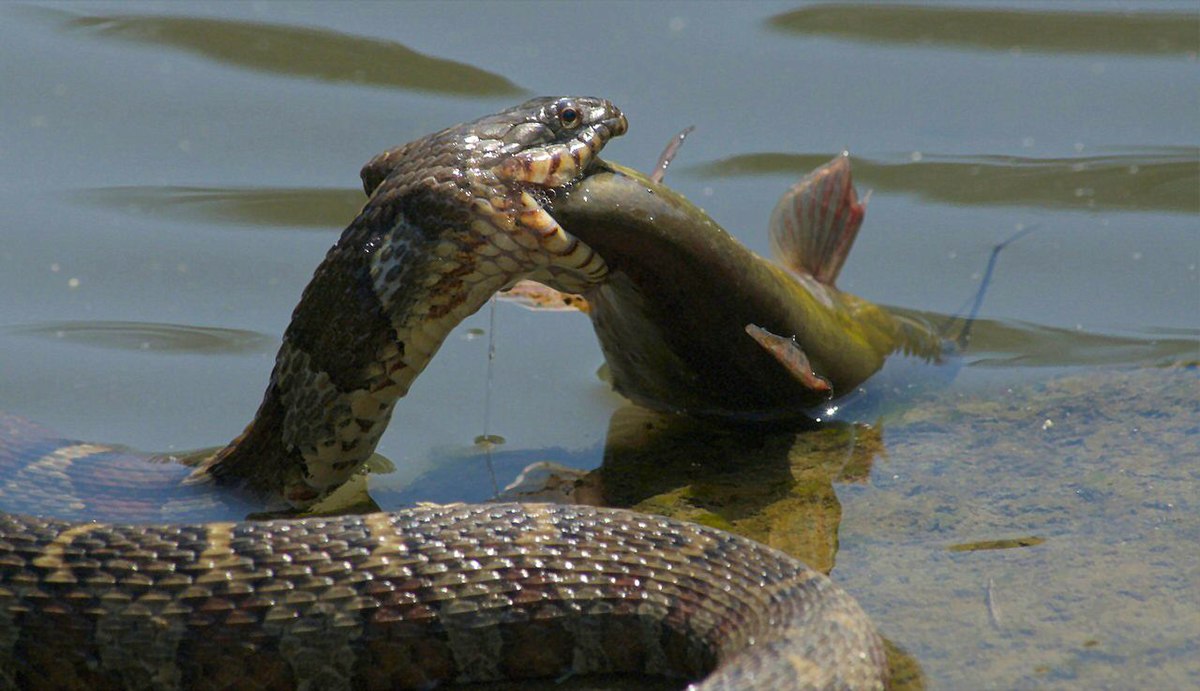Many animals eat fish, including:
1. Predatory fish: Large fish species like sharks, tuna, and barracudas prey on smaller fish.
2. Birds: Various bird species such as eagles, herons, ospreys, and pelicans feed on fish.
3. Mammals: Marine mammals like dolphins, seals, sea lions, and whales consume fish. Some freshwater mammals like otters also eat fish.
4. Reptiles: Crocodiles, alligators, and some species of turtles are known to eat fish.
5. Amphibians: Amphibians like frogs and certain species of salamanders feed on fish, especially when they are tadpoles.
6. Invertebrates: Some invertebrates such as squids, octopuses, and jellyfish may consume small fish.
7. Humans: Fish is a significant part of the human diet worldwide.
These are just a few examples, and there are many more species that eat fish in the animal kingdom.
Know More About: what eats a fish
TOPIC: Predators of Fish: A Closer Look into the Aquatic Food Chain
Introduction:
In the vast and diverse realm of aquatic ecosystems, fish provide a vital link in the food chain. However, even in their watery haven, these sleek and agile creatures have their own share of predators, constantly reminding us of the intricate balance of nature. Join us as we dive into the depths of aquatic habitats to explore the various creatures that prey upon fish, shedding light on the fascinating dynamics of predator-prey relationships beneath the surface.
1. Fierce Felines of the Water: Aquatic Mammals
One of the most recognizable fish predators is the stealthy dolphin. With its keen intelligence and acrobatic abilities, dolphins have honed their fishing techniques over generations. Pods of dolphins methodically coordinate their movements to herd and trap schools of fish, effortlessly swooping in for a meal. Similarly, seals and sea lions have an affinity for fish, utilizing their sleek bodies and sharp teeth to snatch their prey swiftly from the water.
2. Avian Predators: Masters of the Dive
In the sky, numerous bird species have evolved remarkable adaptations to hunt for fish. The osprey, also known as the fish eagle, stands out with its exceptional fishing skills. Hovering mid-air, this raptor locks its talons into a fish swimming below the water’s surface, soaring back into the sky as it triumphantly flaps away with its catch. On the other hand, diving birds like cormorants and pelicans elegantly plunge into the water, equipped with specialized beaks and throat pouches to swiftly catch fish.
3. Mighty Reptilian Hunters: Snakes and Crocodiles
Venturing into freshwater habitats, we encounter reptilian predators that strike fear into the hearts of fish. Snakes like the water moccasin or the green anaconda skillfully blend into aquatic environments, patiently awaiting their moment to seize unwary fish passing by. Meanwhile, crocodiles lurk beneath the surface, their powerful jaws capable of grasping fish in a single swift movement, demonstrating their instinctual aquatic hunting prowess.
4. Fish Taking a Bite Out of Their Own Kin: Cannibalistic Behavior
Surprisingly, not all fish rely solely on plant material or smaller organisms as their food source. Various fish species, such as the infamous barracuda or the freshwater pike, exhibit cannibalistic tendencies. These predators may target smaller members of their own species, taking advantage of their agility, speed, and sharp teeth to secure a meal. This phenomenon illustrates the complex and sometimes ruthless survival strategies within the fish community.
5. Invertebrate Predators: A World of Tiny Hunters
As we explore the microscopic realm, we discover that fish also face threats from a plethora of invertebrate predators. From the voracious mantis shrimp, known for its lightning-fast strikes and powerful claws, to the cunningly camouflaged frogfish waiting patiently for its next victim, these underwater assassins prove that size is not an impediment to being a formidable predator.
Conclusion:
In this captivating journey through nature’s aquatic domains, we have delved into the fascinating array of creatures that prey upon fish. From dolphins to reptiles and birds to other fish, the predator-prey relationships in aquatic ecosystems exemplify the delicate balancing act necessary for the survival of various species. Understanding these dynamics helps us appreciate the intricate tapestry of life under the water, and the unparalleled beauty of the natural world as a whole.
FAQs on what eats a fish
1. What animals eat fish?
Animals that eat fish include birds such as herons, eagles, and kingfishers, as well as mammals like seals, sea lions, and otters. Additionally, larger fish species like sharks, tuna, and pikes are also predators of smaller fish.
2. Do all birds eat fish?
No, not all bird species consume fish as their primary diet. While some birds, like ospreys and pelicans, are known for their fish-eating habits, others, such as sparrows and hummingbirds, primarily feed on insects, seeds, and nectar.
3. Can land animals eat fish?
Yes, several land animals are known to eat fish. Examples include bears, raccoons, otters, and even some domestic pets like cats and dogs. These animals may live near water bodies or have hunting abilities to catch fish.
4. Are humans considered predators of fish?
Yes, humans are one of the most significant predators of fish. Fishing is a popular activity worldwide, providing food and livelihoods for many communities. Various fishing techniques, including netting, angling, and trawling, are employed to catch fish.
5. Which marine animals are fish predators?
Several marine animals are fish predators, such as dolphins, marlins, swordfish, and some species of sharks. These predators use their speed, agility, and specialized hunting adaptations to catch and consume fish.
6. Do insects eat fish?
While it is uncommon for insects to eat fish, some exceptions exist. Certain species of water beetles, dragonfly nymphs, and giant water bugs are known to prey on small fish, tadpoles, or fry when given the opportunity.
7. What are the main factors that determine fish predation?
The main factors that determine fish predation include the predator’s size, hunting ability, swimming speed, habitat preference, and availability of suitable prey. The interaction between predators and fish populations plays a crucial role in maintaining the balance in aquatic ecosystems.
8. Do all fish eat other fish?
No, not all fish species are carnivorous and eat other fish. Many fish are herbivores or omnivores, consuming algae, plants, or a mix of plant matter and small invertebrates. However, predatory fish tend to have a more prominent role in the food chain.
9. Are parasites considered fish predators?
Parasites can affect fish populations, but they are not considered predators in the traditional sense. Certain parasites, like lamprey and leeches, attach themselves to fish and feed on their body fluids, but the interaction is not necessarily predatory and can be harmful to the host fish.
10. Can fish eat other fish from their own species?
Yes, cannibalism in fish does occur, especially when food resources are limited or during certain developmental stages. Fish like pike, largemouth bass, and other piscivorous species have been observed engaging in cannibalistic behaviors, consuming smaller individuals of their own species.

